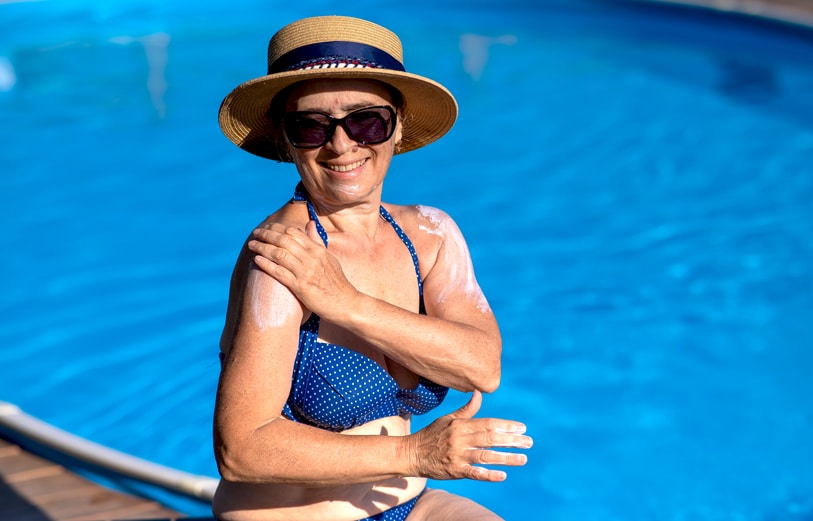Protect Your Skin to Avoid Skin Cancer

Here are 8 practical habits to protect your skin from the sun and reduce your risk of skin cancer.
Should you protect your skin from the sun?
Protecting your skin from the harmful effects of the sun and avoiding skin cancer is an important part of maintaining your overall health.
However, time in the sun has many benefits, which range from regulating our biorhythms and improving our moods to helping our bodies synthesize vitamin D.
Interestingly, a variety of experts will tell you that most individuals can experience optimum health benefits of sunlight through a balance of diligent sun protection and adequate sun exposure.
Consider these 8 practical habits to help protect your skin while enjoying your time in the sun:
- Use sunscreen regularly:
Using sunscreen is one of the most effective ways to protect your skin from the sun’s harmful ultraviolet (UV) rays. Choose a broad-spectrum sunscreen with an SPF of 30 or higher.Apply sunscreen generously to all exposed skin and reapply every two hours or after swimming or sweating. Remember areas like the ears, back of the neck, and tops of your head, hands, and feet. - Stay informed about the UV index:
The UV index measures the strength of the sun's ultraviolet rays and provides a relative guide for sun safety. Check the UV index daily to understand the risk. Take extra precautions to protect your skin from sun exposure on days with a high UV index. - Seek shade during peak hours:
The sun's rays are strongest between 10 a.m. and 4 p.m. Even on cloudy days, UV rays can penetrate the clouds and harm your skin.
Try to stay indoors or in the shade during these hours. If you’re outside, seek shelter under umbrellas, trees, or awnings to reduce sun exposure. - Wear protective clothing:
Clothing can provide an excellent barrier against UV rays. Wear long-sleeved shirts, long pants, and wide-brimmed hats to cover as much skin as possible. Look for clothing with a UV protection factor (UPF) for added protection.Sunglasses with UV protection can also shield your eyes and the delicate skin around them. - Be extra cautious near water, sand, and snow:
Water, sand, snow, and concrete can reflect and intensify the sun’s rays, increasing your risk of sunburn. Be vigilant about applying sunscreen and seeking shade when surrounded by these environments. - Hydrate your skin:
Keep your skin hydrated to help maintain its health and resilience. Use a moisturizer that suits your skin type to prevent dryness and peeling. Well-hydrated skin can withstand and recover more effectively from minor sun exposure. - Perform regular skin checks:
Early detection of skin cancer is an important part of good health maintenance.Perform monthly skin self-examinations to identify new or changing moles or lesions. Use a mirror to check hard-to-see areas or ask a partner for help.Seek medical attention if you notice any areas that have an unbalanced or asymmetrical shape, irregular borders, color changes or variations, and any new or growing spots larger than a pencil eraser.
- Visit a dermatologist annually:
An annual visit to your regular healthcare provider or a dermatologist is essential if you have a personal or family history of skin cancer. These professionals can detect early signs of skin cancer and provide additional guidance on maintaining your skin.
Protecting your skin is the best defense against skin cancer:
Limiting exposure to harmful UV rays is essential to maintaining your overall health and reducing your risk of skin cancer.
Adopt some (or all) of the above habits and prioritize skin protection. Encourage your loved ones to do the same.
Above all, stay safe, protect your skin, and enjoy the sunshine responsibly!

